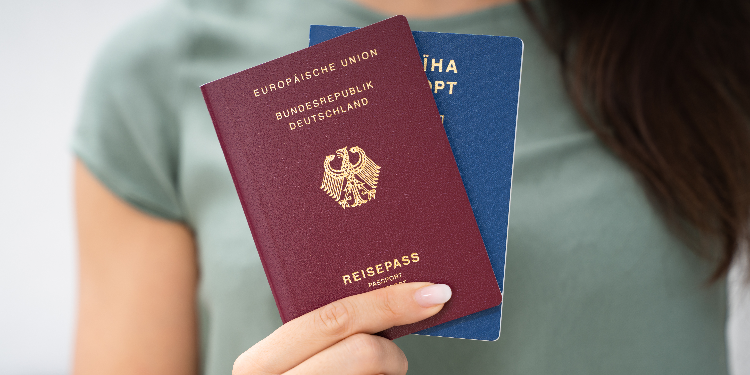
In India, the principle of citizenship has been largely discussed in the media and on the political sphere in the last few weeks. We seize the opportunity to talk about dual citizenship. An opportunity which often arises for expatriates. What is it? And what the pros and cons?
What is dual nationality
Dual or multiple nationality means that a person has citizenship and nationality of two or more countries at the same time. While different rules may apply there is a basic obligatory dimension to the status namely to obey the laws of both or more countries when residing there. In the meantime, you will enjoy the same legal rights, privileges, and responsibilities as any other person in the country. Both countries have a right to expect sole allegiance from the dual nationality but the country of residence at the time probably has the greater claim to loyalty.
Dual nationality is acquired through birth, marriage, naturalization, or even via investment purchasing.
Through birth: If you are born in a country that automatically recognizes citizenship like the USA and your parents have different nationalities, e.g. they are Mexicans, you acquire both nationalities.
Through marriage: Some countries allow you to acquire citizenship when marrying a national of that country e.g. if an Egyptian in South Africa marries a local citizen, they will acquire South African citizenship.
Through naturalization: This is when a person born in another country through a legal process becomes a citizen of a new country. In most cases the naturalized citizen retains his original nationality but, in some cases, he or she will voluntarily relinquish the original nationality. In some cases, naturalized citizens are de-naturalized, meaning they are forced to renounce their original nationality through a loyalty oath. Countries falling in this category include Mexico, Croatia, Slovenia, and Panama.
Through investment purchasing: Countries like Cyprus, Malta, and Belize offer unique citizenship via serious investment that facilitates access to many other countries. Cyprus's citizenship ultimately results in an EU passport costing 2 million Euros while the cost for a Malta nationality is 650,000 Euros and that of Belize only USD 50 000.
Global Status of Dual Nationalities
The list of countries allowing dual nationality is constantly growing and by 2020 stands on fifty plus. Different regulations, policies, and limitations are applied. Many countries don't have problems with dual nationalities but many also have some kind of condition. Some notable examples are:
- Israel, Italy, Ireland, and Spain insist on proven ancestors or a blood line to enjoy a second nationality in their countries.
- In Azerbaijan the President may use his discretion to offer dual nationality to anyone regarded as important to the country.
- Slovakia allow dual nationalities only for those born in the country or marrying another nationality in the country.
- Pakistan forbids dual citizens from certain voting rights, serving in the military, or holding any number of public offices or even civil servant jobs.
- South Korea allows expats to retain their original nationality provided they meet certain criteria or become a citizen through the country's immigrant investor program.
There are more than fifty countries that do not recognize dual citizenship. These countries are not confined to specific continents but are found across the globe and include Andorra, Azerbaijan, Bahamas, Bahrain, Malaysia, the UAE, Venezuela, and China. Also falling under this category are Congo, Djibouti, Cuba, Ethiopia, Haiti, India, Indonesia, Iran, Japan, Kuwait, Kazakhstan, Monaco, Singapore, Oman, Qatar, Saudi Arabia, Nepal, Mozambique, and Zimbabwe, whose citizens automatically lose their nationalities upon acquisition of citizenship in another country. Citizens leaving for another country are basically slammed with an exit ban. Some of these countries will however allow dual nationality in their own countries in special circumstances.
The advantages of dual nationalities
Put simply, the basic advantage of dual nationality is to enjoy double the privileges and benefits coming with the nationality for example carrying two passports that create travel freedom, the right of entry at will into either of the countries, smoother customs, and visa-free travelling. In most countries you will acquire voting rights and, in some cases, may even stand for political positions.
Another advantage is the exposure to cultural diversity that affords opportunities to learn new languages, develop new lifestyles, and facilitates new entrepreneurial opportunities. Further to this you will acquire the right to own property, keep scattered family members together, and your children are afforded the opportunity to gain access to top schools and universities, particularly in the USA, UK, and Europe.
Some decide on a new nationality to escape social unrest, political turmoil, economic strife, uncontrolled and endemic violence, religious persecution, or discrimination. For them, a new home committed to the rule of law will provide security, protection, and safety for the family. Others opt for a second nationality in a country that is more agreeable with personal privacy and less intrusive, or a country that is known for high standards of health care or universal healthcare, or a country that is on a par with globalization trends and facilitates special access to trade and job opportunities.
Potential challenges to dual nationalities
The challenges and some disadvantages that should be considered before starting a process to obtain a second nationality include the following:
- The cost and long duration of obtaining a second nationality especially through marriage or naturalization which can take years. In the USA it can take anything between 3 and 10 years and costs thousands of US Dollars.
- You have to make sure in advance that your second nationality will not undermine your oath of allegiance in your original country.
- Multiple tax obligations like dual taxation and related laws.
- Limitations on political participation and access to governmental jobs. In Australia, Jamaica, and Pakistan you have to renounce your original nationality if you want to fill a political position.
- Mandatory military service in your new country. Egypt, Greece, Iran, Lebanon, and Israel by law can require from you to do such service. There are exceptions relating to age, health, and specific sensitive jobs.
- Complexities of laws e.g. which country's laws will be applicable to cases like criminal prosecutions, marriages, divorce, and child custody settlements.



















